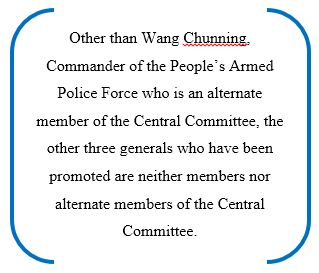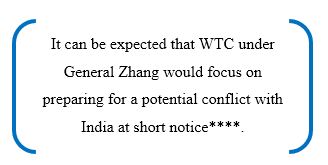KK Venkatraman, Research Fellow, ICS

On 18 December 2020, President Xi Jinping promoted four officers of the People’s Liberation Army (PLA) and the People’s Armed Police Force to the highest rank of General. This includes Zhang Xudong (张旭东) newly appointed Commander of the Western Theatre Command (WTC) which looks after the Line of Actual Control with India. While the exact date when General Zhang took over from Zhao Zongqi is not known, it can be confirmed that General Zhao Zongqi tenanted the appointment till as late as end-September 2020, despite being due for retirement in April 2020.
Not much is known about General Zhang Xudong. His date of birth – Mar 1962 and native province – Liaoning reflected in Wikipedia cannot be corroborated from other sources. This article deals with the knowns before proceeding to the realm of analysis and prognosis.
Knowns
Promoted as Major General in 2012, Zhang commanded the 115 Division which was part of erstwhile-39 Group Army* before being promoted as Chief of Staff of 39 Group Army and was appointed as its Commander in April 2014. As Commander of 39 Group Army, he is credited with introducing standards for precise evaluation of combat effectiveness and conducted a Joint Campaign Planning Exercise of the 39 Group Army at Horqin, Inner Mongolia in October 2014.

Post-2016 reforms, he was appointed as Commander of Central Theatre Army prior to 18 Mar 2017 and later Deputy Central Theatre Commander in early-2018. He was promoted as Lieutenant General on 01 Aug 2018 and was Deputy Commander of the Military Parade commemorating the 70th Anniversary of founding of China in 2019.
From the party status perspective, his elevation is unusual as he is neither a member nor an alternate member of the 19th Central Committee of the Communist Party of China. In fact, other than Wang Chunning, Commander of the People’s Armed Police Force who is an alternate member of the Central Committee, the other three generals who have been promoted are neither members nor alternate members of the Central Committee. It is also known that he was Deputy Party Secretary of 115 Division and later 39 Group Army.
He is likely to have co-authored an article titled Use the Party’s Innovative Theory to Focus on Military Education (用党的创新理论贯注部队教育官兵要做到这四点) with Zhou Wanzhu, then Political Commissar of Central Theatre Army, which was published by the PLA Daily on 22 Mar 2017. The article talks about the implementation of party’s innovative theory as expressed through speeches of Xi Jinping, using the Chinese dream to strengthen the Army, improvement of combat effectiveness to meet traditional and non-traditional threats and educating officers and soldiers on the same.

Analysis
PLA officers generally spend their complete career in the same military region. Thus, General Zhang would have spent the bulk of his career in the erstwhile-Shenyang Military Region, which covered the North Eastern provinces of Heilongjiang, Jilin and Liaoning and was responsible for the Russian Far East and Korean Peninsula. The 39 Group Army (including the 115 Division), a Type A Group Army** was responsible for contingencies in Korea and was amongst the first armies to fight UN troops in the 1952 Korean War. While the terrain and weather are not comparable to North-Western Plateau, the Eastern part of Korean Peninsula is mountainous with sub-zero temperatures in winters and provides adequate experience for operations in mountainous terrain.
His command of 115 Division and 39 Group Army is also significant as Korean Peninsula underwent a period of heightened tensions around the same time, with North Korean nuclear tests in 2009, 2013 and 2016, sinking of South Korean naval ship Cheonan by a DPRK submarine in 2010, death of Kim Jong-Il and the political transition in North Korea in 2011, failed satellite launch by North Korea in 2012 and the joint US-South Korean announcement of deployment of Terminal High Altitude Area Defence (THAAD) in 2016. In response, the Shenyang Military Region enhanced its military preparedness to intervene in the Korean Peninsula, if necessary, and both 115 Infantry Division and 39 Group Army under Zhang Xudong would have had a significant role if the PLA had intervened in the Korean Peninsula.
The Central Theatre Command is responsible for defence of Beijing, providing security to CCP leadership and acts as the strategic reserve. Thus, General Zhang as Army Commander and Deputy Commander of Central Theatre would be well versed with operational plans of WTC as well as shortcomings identified during the current crisis. It would also attest to his political reliability as the Theatre is also responsible for the security of Beijing.
The Jinan Military Region served as the testbed for PLA Army’s reforms in pre-Reforms era. It is likely that the Central Theatre Command, as its successor, is in the forefront of PLA’s experiments in Joint Operations in the post-reforms period providing him with significant experience in preparing for Joint Operations in addition to his earlier experiences with Joint Command Planning in 39 Group Army.
Change of commanders*** indicates that Beijing does not view conflict as imminent. However, it is likely that WTC would carry out a deep introspection of its operational plans and preparedness based on the current crisis. With the PLA issuing its Outline of Joint Operations recently and the Fifth Plenum Communique stressing the need to improve strategic ability to defend national sovereignty and achieve Centennial goals of PLA by 2027, PLA and WTC will undergo further reforms.
His appointment also confirms two trends observed in China and PLA. One, of promoting little known personalities to higher levels to ensure their loyalty to President Xi Jinping. Two, of transferring senior PLA officers to other theatres on promotion to ensure that they do not create/ strengthen their power bases.
Prognosis

General Zhang brings with him expertise on mountain warfare, joint operations and crisis-management skills, tag of political reliability as well as the backing of Xi Jinping. He is well placed to rectify shortcomings identified in operational plans in the past eight months as well as ensure success of reforms in WTC. Thus, it can be expected that WTC under General Zhang would focus on preparing for a potential conflict with India at short notice****. In the interim, it can be expected that barring misunderstandings, WTC would not trigger a crisis, which it is not capable of handling. Two aspects however, need to be watched out for; one, the de-induction of formations which have inducted from other Theatre Commands to WTC during the current crisis and two, the elevation of General Zhang to the 20th CPC Central Committee in 2022.
Author’s Notes
* The 39 Group Army was redesignated as 79 Group Army and became part of the Northern Theatre Command following the 2016-reforms.
** The 18 Group Armies in the pre-reform era were classified into Type A and Type B Group Armies, with Type A Group Armies, well-equipped and fully manned with a higher state of operational preparedness.
*** On 13 Oct 2020, Lieutenant General PGK Menon took over as General Officer Commanding of the Indian Army’s Fire and Fury Corps, responsible for operations in Eastern Ladakh.
**** This does not necessarily mean war. However, it must be kept in mind that prior to the 1962 War, formations had inducted as early as 1959 and by 1962, they were well-prepared. The final decision for war was only taken (p.117) on 6 Oct 1962, just four days prior to the war.
The views expressed and suggestions made in the article are solely that of the author in his personal capacity and do not have any official endorsement. Attributability of the contents lies purely with the author.